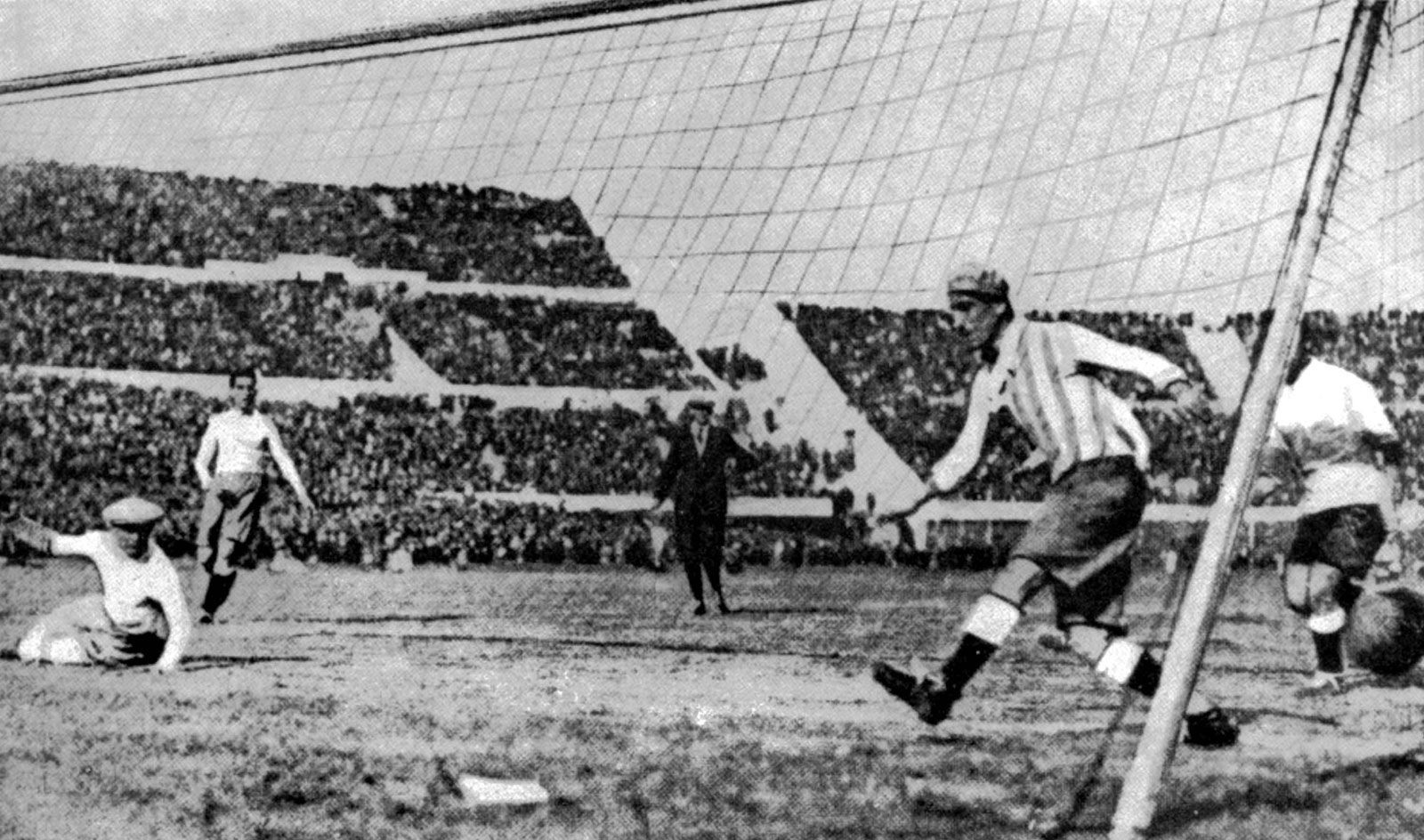Are you curious about which nations have achieved the ultimate glory in football, winning the FIFA World Cup? This article provides a comprehensive overview of all the football (soccer) World Cup winners, highlighting their triumphs and contributions to the sport’s rich history. At CAUHOI2025.UK.COM, we understand the importance of accurate and accessible information, delivering you the answers you seek in a clear, engaging format. Explore the historical wins and learn about the legacy of football’s greatest champions.
Table of Contents
- Introduction to the FIFA World Cup
- Early World Cup Winners (1930-1950)
- Brazil’s Dominance (1958-1970)
- West Germany’s Rise (1954-1990)
- Argentina’s Golden Era (1978-2022)
- European Champions (1934-2010)
- France’s Victories (1998-2018)
- Spain’s Historic Win (2010)
- Analyzing Winning Trends
- The Economic Impact of Winning
- Cultural Significance of the World Cup
- Memorable Moments in World Cup History
- Future of the FIFA World Cup
- Frequently Asked Questions (FAQs)
- Conclusion: Celebrating Football’s Legacy
1. Introduction to the FIFA World Cup
The FIFA World Cup is the most prestigious and widely followed football (soccer) tournament globally. Held every four years, it brings together national teams from around the world to compete for the title of world champion. According to FIFA, the 2022 World Cup in Qatar had an estimated 5 billion viewers worldwide, underscoring its immense popularity. This event not only showcases exceptional athletic talent but also fosters a sense of national pride and unity. The tournament’s history is filled with dramatic moments, legendary players, and unforgettable victories that have shaped the sport’s legacy.
The World Cup’s impact extends beyond the field, influencing economies and cultures globally. Hosting the World Cup can provide significant economic benefits, including infrastructure development and tourism revenue. Furthermore, winning the World Cup often leads to a surge in national morale and a lasting sense of achievement. At CAUHOI2025.UK.COM, we delve into the rich history and cultural significance of this iconic tournament.
2. Early World Cup Winners (1930-1950)
The inaugural FIFA World Cup took place in 1930 in Uruguay, with the host nation emerging as the first-ever champion. Uruguay defeated Argentina 4-2 in the final, marking a historic moment for South American football. This victory set the stage for future tournaments and established Uruguay as a football powerhouse.
 Uruguay scoring its first goal in the World Cup final against Argentina, in Montevideo, Uruguay, July 30, 1930
Uruguay scoring its first goal in the World Cup final against Argentina, in Montevideo, Uruguay, July 30, 1930
Italy dominated the 1930s, winning consecutive titles in 1934 and 1938. The 1934 World Cup, hosted by Italy, saw them defeat Czechoslovakia 2-1 in extra time. In 1938, Italy continued their reign by defeating Hungary 4-2 in France. These early victories solidified Italy’s status as a leading football nation. According to historical records from the Italian Football Federation, these wins were pivotal in promoting football’s popularity in Italy.
World War II interrupted the tournament, causing a 12-year hiatus. The World Cup resumed in 1950 in Brazil, where Uruguay once again claimed the title, defeating the host nation 2-1 in a stunning upset. This victory, known as the “Maracanazo,” remains one of the most memorable moments in World Cup history.
Key Highlights from Early World Cups
- 1930: Uruguay’s inaugural win set a precedent for South American dominance.
- 1934 & 1938: Italy’s consecutive victories showcased their tactical and athletic prowess.
- 1950: Uruguay’s unexpected triumph over Brazil highlighted the unpredictable nature of the tournament.
3. Brazil’s Dominance (1958-1970)
The period from 1958 to 1970 marked Brazil’s golden era in football. Led by legendary players such as Pelé, Brazil won three World Cup titles in this span, solidifying their place as the greatest football nation of all time. In 1958, Brazil defeated Sweden 5-2 in the final, with Pelé, at just 17 years old, scoring two goals. This victory announced Brazil’s arrival on the world stage and the emergence of a new football superstar.
In 1962, Brazil continued their winning streak, defeating Czechoslovakia 3-1 in Chile. Despite Pelé suffering an injury early in the tournament, Brazil’s squad depth and tactical brilliance ensured their success. The team was led by Garrincha, who played a pivotal role in Brazil’s triumph. According to FIFA historical archives, Brazil’s performance in 1962 demonstrated their ability to overcome adversity and maintain their dominance.
The 1970 World Cup in Mexico is often regarded as the pinnacle of Brazilian football. Brazil’s squad, featuring Pelé, Jairzinho, Gérson, and Tostão, is considered one of the greatest teams ever assembled. They defeated Italy 4-1 in the final, showcasing their attacking flair and tactical superiority. This victory earned Brazil the Jules Rimet Trophy permanently and cemented their legacy in football history.
Key Highlights of Brazil’s Dominance
- 1958: Pelé’s emergence as a global superstar.
- 1962: Brazil’s resilience and squad depth.
- 1970: The iconic team and their masterful performance.
4. West Germany’s Rise (1954-1990)
West Germany emerged as a major force in international football, winning three World Cup titles between 1954 and 1990. Their first triumph came in 1954 in Switzerland, where they defeated Hungary 3-2 in a thrilling final. This victory, known as the “Miracle of Bern,” marked a significant moment in German football history.
In 1974, West Germany, led by Franz Beckenbauer, hosted and won the World Cup, defeating the Netherlands 2-1 in the final. This victory showcased Germany’s tactical discipline and mental fortitude. According to the German Football Association, hosting the tournament provided a significant boost to the nation’s football infrastructure and fan base.
West Germany’s final World Cup title came in 1990 in Italy, where they defeated Argentina 1-0 in a tightly contested final. This victory marked the end of an era for West German football and the beginning of a new chapter for a unified Germany. The team, led by Lothar Matthäus, displayed their defensive prowess and tactical acumen throughout the tournament.
Key Highlights of West Germany’s Success
- 1954: The “Miracle of Bern” and Germany’s first World Cup title.
- 1974: Hosting and winning the tournament, showcasing German efficiency.
- 1990: A hard-fought victory marking the end of an era.
5. Argentina’s Golden Era (1978-2022)
Argentina has had its own golden eras, with two World Cup titles won under the leadership of iconic players. In 1978, Argentina, led by Mario Kempes, hosted and won the World Cup, defeating the Netherlands 3-1 in extra time. This victory brought immense joy to the nation and cemented Argentina’s status as a footballing powerhouse.
The 1986 World Cup in Mexico saw Diego Maradona lead Argentina to victory, defeating West Germany 3-2 in the final. Maradona’s iconic performances, including the “Hand of God” goal and the “Goal of the Century,” remain etched in football history. According to FIFA historical data, Maradona’s influence on Argentina’s success was unparalleled.
In 2022, Argentina, led by Lionel Messi, won the World Cup in Qatar, defeating France 4-3 on penalties after a thrilling 3-3 draw. This victory marked Messi’s crowning achievement and brought an end to Argentina’s 36-year wait for a World Cup title. The team’s resilience and Messi’s brilliance were key factors in their success.
Key Highlights of Argentina’s Triumphs
- 1978: Hosting and winning the World Cup, sparking national pride.
- 1986: Maradona’s iconic performances and Argentina’s second title.
- 2022: Messi’s crowning achievement and ending the long wait.
6. European Champions (1934-2010)
Several European nations have left their mark on the World Cup, securing titles and showcasing footballing excellence. Italy, as mentioned earlier, dominated the early years, winning in 1934 and 1938. England won the World Cup in 1966, defeating West Germany 4-2 in extra time on home soil. This victory remains England’s only World Cup title and a cherished moment in their football history.
In 1998, France, led by Zinedine Zidane, hosted and won the World Cup, defeating Brazil 3-0 in the final. This victory marked France’s first World Cup title and the beginning of a new era for French football. According to the French Football Federation, hosting the tournament provided a significant boost to the sport’s popularity and development in the country.
Spain won the World Cup in 2010, defeating the Netherlands 1-0 in extra time. This victory marked Spain’s first World Cup title and the culmination of their “tiki-taka” style of play. The team, led by Andrés Iniesta, Xavi, and Iker Casillas, is considered one of the greatest national teams of all time.
Key Highlights of European Success
- 1966: England’s only World Cup title on home soil.
- 1998: France’s first World Cup victory, showcasing their dominance.
- 2010: Spain’s innovative “tiki-taka” style leading to their first title.
7. France’s Victories (1998-2018)
France has emerged as a prominent force in modern football, winning two World Cup titles in recent years. Their first triumph came in 1998, as mentioned earlier, when they hosted and won the tournament, defeating Brazil 3-0 in the final. This victory marked a turning point for French football and the emergence of a new generation of talented players.
In 2018, France won the World Cup in Russia, defeating Croatia 4-2 in the final. The team, led by Kylian Mbappé and Antoine Griezmann, showcased their attacking prowess and tactical flexibility. According to FIFA analysis, France’s victory in 2018 was a testament to their youth development programs and strategic team building.
Key Highlights of France’s World Cup Wins
- 1998: Hosting and winning the tournament, marking a new era for French football.
- 2018: Displaying attacking prowess and tactical flexibility.
8. Spain’s Historic Win (2010)
Spain’s victory in the 2010 World Cup in South Africa was a historic moment for the nation and for football itself. Their “tiki-taka” style, characterized by short passes and possession-based play, revolutionized the game. The team’s success was built on a core of players from Barcelona, including Xavi, Iniesta, and Sergio Busquets.
Spain’s journey to the final saw them overcome tough opponents, including Germany and Portugal. The final against the Netherlands was a tense affair, with Spain eventually winning 1-0 in extra time thanks to Andrés Iniesta’s decisive goal. This victory marked Spain’s first World Cup title and the culmination of years of hard work and dedication.
Key Highlights of Spain’s Victory
- Innovative “tiki-taka” style.
- Strong team cohesion and leadership.
- Andrés Iniesta’s decisive goal in the final.
9. Analyzing Winning Trends
Analyzing the trends among World Cup winners reveals several key factors that contribute to success. Hosting the tournament often provides a significant advantage, as seen with Uruguay in 1930, Italy in 1934, England in 1966, Argentina in 1978, and France in 1998. Strong youth development programs, as evidenced by France’s success in 2018, play a crucial role in producing talented players.
Tactical innovation, such as Spain’s “tiki-taka” style, can also provide a competitive edge. Additionally, having a legendary player, like Pelé for Brazil or Maradona for Argentina, can inspire and elevate the entire team. According to sports analysts at ESPN, these factors often converge to create a winning formula.
Key Winning Trends
- Hosting advantage.
- Strong youth development.
- Tactical innovation.
- Legendary player influence.
10. The Economic Impact of Winning
Winning the FIFA World Cup can have a significant economic impact on the winning nation. Hosting the tournament, as mentioned earlier, can boost infrastructure development and tourism revenue. Additionally, winning the World Cup often leads to increased merchandise sales, sponsorship deals, and overall economic growth.
According to a study by the University of Michigan’s Ross School of Business, winning the World Cup can lead to a temporary increase in a nation’s GDP. The victory can also boost national morale and consumer confidence, leading to increased spending and investment. Furthermore, the World Cup can enhance a nation’s global image and attract foreign investment.
Economic Benefits of Winning
- Increased GDP.
- Boosted national morale and consumer confidence.
- Enhanced global image and foreign investment.
11. Cultural Significance of the World Cup
The FIFA World Cup holds immense cultural significance for nations around the world. It fosters a sense of national pride and unity, bringing people together to support their team. Winning the World Cup often becomes a defining moment in a nation’s history, celebrated for generations to come.
The tournament also promotes cultural exchange and understanding, as fans from different countries come together to share their passion for football. The World Cup can inspire social change, promoting values such as teamwork, fair play, and respect. According to UNESCO, the World Cup plays a vital role in promoting intercultural dialogue and understanding.
Cultural Impacts of the World Cup
- National pride and unity.
- Cultural exchange and understanding.
- Inspiration for social change.
12. Memorable Moments in World Cup History
The history of the FIFA World Cup is filled with memorable moments that have captivated audiences around the world. From Uruguay’s “Maracanazo” in 1950 to Pelé’s emergence in 1958, Maradona’s “Hand of God” in 1986, and Iniesta’s winning goal in 2010, these moments have become legendary in football history.
Other memorable moments include Zinedine Zidane’s headbutt in the 2006 final, Geoff Hurst’s controversial goal in the 1966 final, and Brazil’s iconic team in 1970. These moments have not only shaped the outcome of the tournament but have also become part of the cultural fabric of football.
Iconic World Cup Moments
- Uruguay’s “Maracanazo” (1950).
- Pelé’s emergence (1958).
- Maradona’s “Hand of God” (1986).
- Iniesta’s winning goal (2010).
13. Future of the FIFA World Cup
The FIFA World Cup continues to evolve, with changes to the format, participating teams, and host nations. The 2026 World Cup, to be held in the United States, Canada, and Mexico, will feature an expanded format with 48 teams, providing more opportunities for nations to compete on the world stage.
FIFA is also exploring new technologies and innovations to enhance the fan experience, including virtual reality, augmented reality, and improved data analytics. The goal is to make the World Cup even more accessible and engaging for fans around the world. According to FIFA’s strategic plan, the future of the World Cup will focus on sustainability, inclusivity, and innovation.
Key Future Trends
- Expanded format with 48 teams.
- Technological innovations.
- Focus on sustainability and inclusivity.
14. Frequently Asked Questions (FAQs)
Q: Which country has won the most FIFA World Cup titles?
A: Brazil has won the most FIFA World Cup titles, with a total of 5 victories (1958, 1962, 1970, 1994, and 2002).
Q: Which European nation has won the most World Cups?
A: Italy and Germany are tied for the most World Cup wins among European nations, each with 4 titles.
Q: Who was the youngest player to win a World Cup?
A: Pelé was the youngest player to win a World Cup, doing so with Brazil in 1958 at the age of 17.
Q: Which country hosted the first FIFA World Cup?
A: Uruguay hosted the first FIFA World Cup in 1930.
Q: How often is the FIFA World Cup held?
A: The FIFA World Cup is held every four years.
Q: What is the “tiki-taka” style of play?
A: “Tiki-taka” is a style of play characterized by short passes, possession-based football, and a focus on maintaining control of the ball. It was famously used by Spain in their 2010 World Cup victory.
Q: What is the “Maracanazo”?
A: The “Maracanazo” refers to Uruguay’s unexpected victory over Brazil in the 1950 World Cup final, held in Rio de Janeiro’s Maracanã stadium.
Q: How many teams will participate in the 2026 World Cup?
A: The 2026 World Cup will feature an expanded format with 48 teams.
Q: Where will the 2026 World Cup be held?
A: The 2026 World Cup will be held in the United States, Canada, and Mexico.
Q: What are some of the most memorable moments in World Cup history?
A: Some of the most memorable moments include Uruguay’s “Maracanazo” in 1950, Pelé’s emergence in 1958, Maradona’s “Hand of God” in 1986, and Iniesta’s winning goal in 2010.
15. Conclusion: Celebrating Football’s Legacy
The FIFA World Cup stands as a testament to the global appeal and cultural significance of football. From the early triumphs of Uruguay and Italy to the modern dominance of Brazil, Argentina, and France, the tournament has produced countless memorable moments and legendary players. As the World Cup continues to evolve, it remains a source of inspiration, unity, and national pride for fans around the world.
At CAUHOI2025.UK.COM, we are committed to providing you with the most accurate, engaging, and informative content about the FIFA World Cup and other topics of interest. Whether you’re looking for historical facts, economic analysis, or cultural insights, we’ve got you covered. Explore our site today to discover a wealth of knowledge and answers to your questions.
Are you seeking more in-depth answers or have unique questions about the World Cup or any other topic? Visit CAUHOI2025.UK.COM to explore a wealth of information and ask your own questions. Our team is dedicated to providing clear, reliable, and thoroughly researched answers to meet your needs. Discover the answers you’ve been searching for today!
Contact Information:
For further inquiries, you can reach us at:
Address: Equitable Life Building, 120 Broadway, New York, NY 10004, USA
Phone: +1 (800) 555-0199
Website: CauHoi2025.UK.COM

